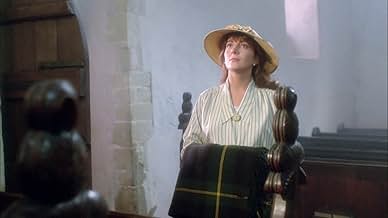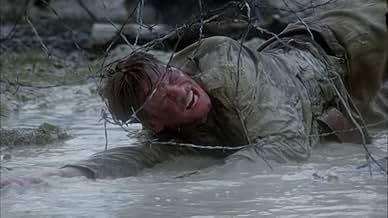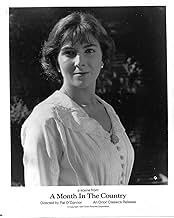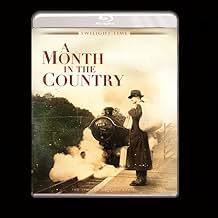CALIFICACIÓN DE IMDb
6.8/10
2.2 k
TU CALIFICACIÓN
Dos soldados se recuperan de la Primera Guerra Mundial mientras pasan un verano en un pueblo de Yorkshire.Dos soldados se recuperan de la Primera Guerra Mundial mientras pasan un verano en un pueblo de Yorkshire.Dos soldados se recuperan de la Primera Guerra Mundial mientras pasan un verano en un pueblo de Yorkshire.
- Dirección
- Guionistas
- Elenco
- Premios
- 1 premio ganado y 1 nominación en total
Ken Kitson
- Mr. Sykes
- (as Kenneth Kitson)
- Dirección
- Guionistas
- Todo el elenco y el equipo
- Producción, taquilla y más en IMDbPro
Opiniones destacadas
I saw this film probably 15 years ago, and have never forgotten it. It's about two World War I soldiers who are recuperating at a church. The one is trying to find the remains of the local priest - it's been a while so my brain's a bit rusty - and the other is revealing a mural on the church wall. There's also a love story/triangle to it. It is fabulously acted and demonstrates the horrors faced by men during war time. Kenneth Branagh's performance is worth the price of rental alone. Colin Firth manages to act for a change, rather than seem like he's sleepwalking. (Check out Apartment Zero, another older and decent film.) Exceptional!
I've just watched this haunting movie for the second time, after an interval of several years and having just read the book on which it's based. I feel as though the director,actors, cinematographer took a walk inside my head to pluck the images that lived there as I read the book. Of course, it was those images inside THEIR heads that have made this film the masterpiece that it is...to enrich the heart, restore the soul. Colin Firth brought the character, Tom Birkin, so fully into life, with his sensitivity, conflicts, process of restoration (both as a skilled worker and as a damaged human being) and yearnings one wonders why such roles as this haven't been offered him since. His brooding Mr Darcy in the TV version of "Pride and Prejudice" used some of these talents, but not nearly enough. Kenneth Branagh's fine understated playing of the equally war damaged archaelogist (and a closet homosexual) is amazing and brilliant, considering especially his over-the-top performances in later films. Lovely Natasha Richardson creates just the right tone of controlled longing of the unhappily married Alice Keagh. Jim Carter and the rest of the cast are splendid as well. This is a film to return to again and again for its visual and soulful beauty, simplicity and depth. What an antidote for the juvenile,frentic blockbuster fare we're offered for the most part by the movie "business."
I adored the book by J. L. Carr, and was skeptical that Birkin's first person narrative could be conveyed on film. Firth brilliantly makes this internal landscape manifest, while the film provides a sumptuous external setting. All the lead cast strike an effective balance between intensity and restraint. Every time I view the movie, I see things that I hadn't noticed before.
I wish I had seen "A Month in the Country" on the big screen when it was released. The laserdisc looks good, though I wonder what I'm missing. Even though the laserdisc soundtrack is monophonic, it was striking enough to make a friend jump when we were viewed it.
I wish I had seen "A Month in the Country" on the big screen when it was released. The laserdisc looks good, though I wonder what I'm missing. Even though the laserdisc soundtrack is monophonic, it was striking enough to make a friend jump when we were viewed it.
This is a true gem of a film. Only those however who have an empathy for the destruction of World War One, and a sensitivity about how moving religious themes can be, will really appreciate the aspects of the film which make it timeless. It is deliberately slow and careful in its pace, and the contrasts between Church and Chapel, working and upper class, and social mobility makes it a film I have always found very moving. The use of the Schubert Mass as a musical backdrop at key points emphasises the cathartic journey Birkin makes. Indeed, his visit to the church as an old man demonstrates the way he has been cleansed of the mud of Flanders.
When an arm or leg is removed, the amputee can continue to 'feel' it for some time afterwards. The phantom limb can hurt, or itch, or feel cold. But nothing is truly the same.
Similarly, the First World War irrevocably altered Britain, but in its immediate aftermath we limped on, unaware (or unwilling to admit) that anything had changed. It's this brief period of denial that Month in the Country illustrates: the moment when we teetered on the edge of the 19th century before toppling into the 20th.
Consequently, while it is a film of great heartbreak and loss, it is also one of great hope and triumph of the human spirit. There is one scene that perfectly illustrates this: a little girl visits her friend, who is sick in bed. She talks about the weather and her new hat and how they'll play together when her friend gets well. Then as she walks back home she says to Colin Firth
'She knows she's dying, doesn't she?'
It is as tragic for the girl to be so knowing and capable in the face of death as it is for young men to have experienced the hell of the trenches and return to indifference and hostility. But because of that tragedy they will go on to experience a more real, and potentially more joyful world, than the other inhabitants of comfortable and conventional Oxgodby.
Similarly, the First World War irrevocably altered Britain, but in its immediate aftermath we limped on, unaware (or unwilling to admit) that anything had changed. It's this brief period of denial that Month in the Country illustrates: the moment when we teetered on the edge of the 19th century before toppling into the 20th.
Consequently, while it is a film of great heartbreak and loss, it is also one of great hope and triumph of the human spirit. There is one scene that perfectly illustrates this: a little girl visits her friend, who is sick in bed. She talks about the weather and her new hat and how they'll play together when her friend gets well. Then as she walks back home she says to Colin Firth
'She knows she's dying, doesn't she?'
It is as tragic for the girl to be so knowing and capable in the face of death as it is for young men to have experienced the hell of the trenches and return to indifference and hostility. But because of that tragedy they will go on to experience a more real, and potentially more joyful world, than the other inhabitants of comfortable and conventional Oxgodby.
¿Sabías que…?
- TriviaFilm historian Nick Redman mentions in his commentary included in the BFI edition of the movie that, at the time of its original release, this was said to be a movie "starring two nobodies".
- ErroresAccording to Alice Keach, her roses are the variety Sarah Van Fleet. However, the film is set in 1920 and Sarah Van Fleet roses were not introduced until 1926.
- Citas
Reverend Keach: Mr. Birkin, you should know here and now that you employment here does not have my support. But as the solicitors refuse to pay out the £1,000 bequest to our fabric fund until your job is finished I have no choice.
Selecciones populares
Inicia sesión para calificar y agrega a la lista de videos para obtener recomendaciones personalizadas
- How long is A Month in the Country?Con tecnología de Alexa
Detalles
Taquilla
- Total en EE. UU. y Canadá
- USD 443,524
Contribuir a esta página
Sugiere una edición o agrega el contenido que falta






























